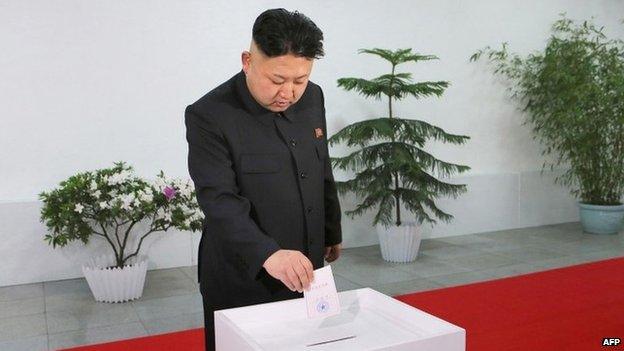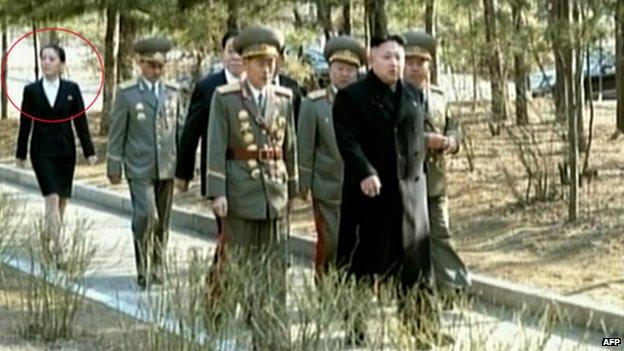North Korea's Kim Jong-un in 'unanimous poll win'
- Published

Mr Kim became leader of North Korea after his father died in 2011
North Korean leader Kim Jong-un has been elected to the country's rubber-stamp parliament with a unanimous vote from his district, state media say.
Mr Kim's 100% approval from his Mount Paektu constituency reflects the "absolute support" of people in the country, KCNA news agency says.
The elections for the Supreme People's Assembly on Sunday had just one name on the ballot for each district.
It was the first time such a poll had been held since Mr Kim assumed power.
His younger sister has also made her first official appearance in state media, suggesting that she is a rising force in the hierarchy.
Kim Yo-jong, who is thought to be 26, was shown in Mr Kim's entourage as he went to cast his ballot at a polling station at Kim Il-sung university.
She was identified by name and the honorific "comrade" by state television and described as a senior official.
She has been seen accompanying her brother on previous occasions but has not been identified by name before.

Kim Jong-un's younger sister is seen as a rising figure in the North Korean hierarchy
Kim Jong-un became leader of North Korea following the death of his father, Kim Jong-il, in 2011.
North Korea usually votes once every five years to approve members of the highest legislative body, the Supreme People's Assembly.
Each of the 687 districts had only one candidate running for office, with voters required to write "Yes" or "No" on the ballot paper.
KCNA said of Mr Kim's victory: "This is an expression of all the service personnel and people's absolute support and profound trust in Supreme Leader Kim Jong-un as they single-mindedly remain loyal to him."
The results of the other districts have yet to be announced.
Mr Kim holds many titles, including Supreme Commander of the armed forces.
Analysts say that the only real value in these polls is in watching for any signs of change in the list of state-approved candidates.
The democratic duty for voters in these elections is not so much deciding who they want to represent them, but whether they agree with the ruling party's choice, says the BBC's Lucy Williamson in Seoul.
In the election held in 2009, turnout was 99%, with 100% of votes in favour of the named candidates.